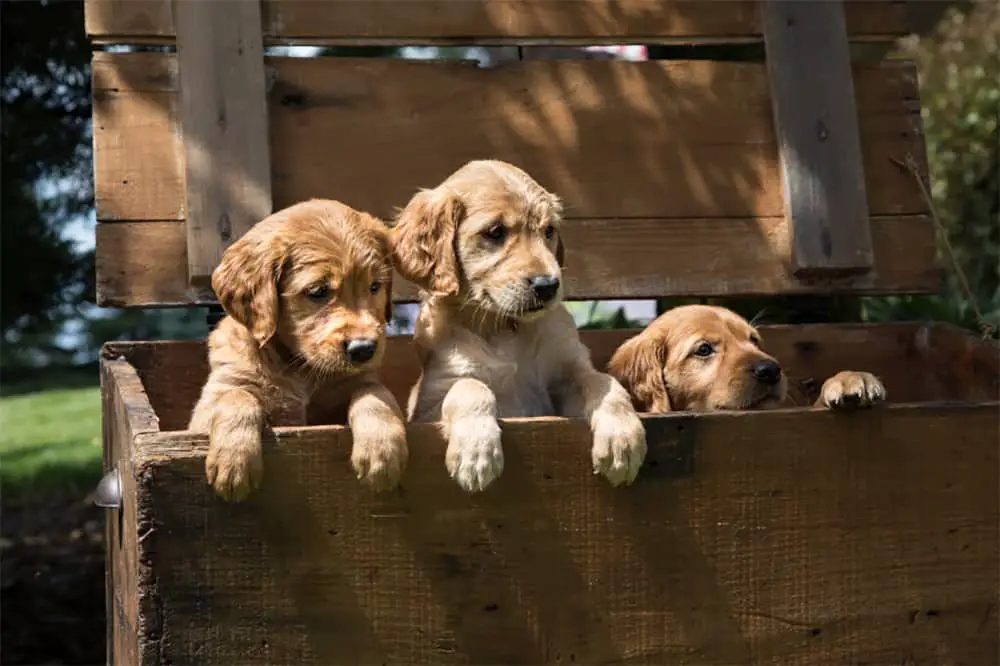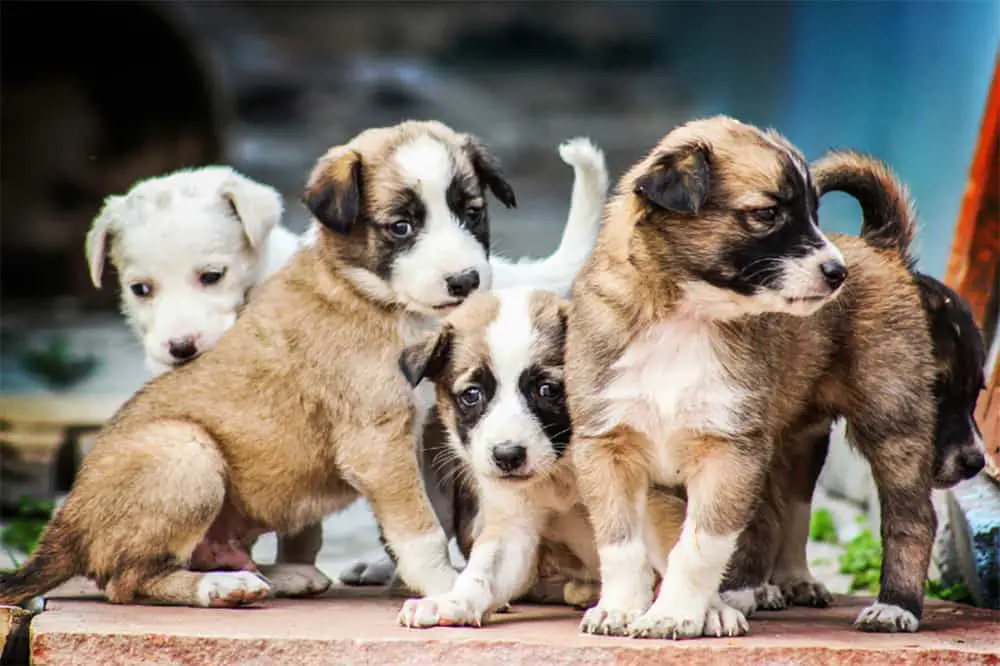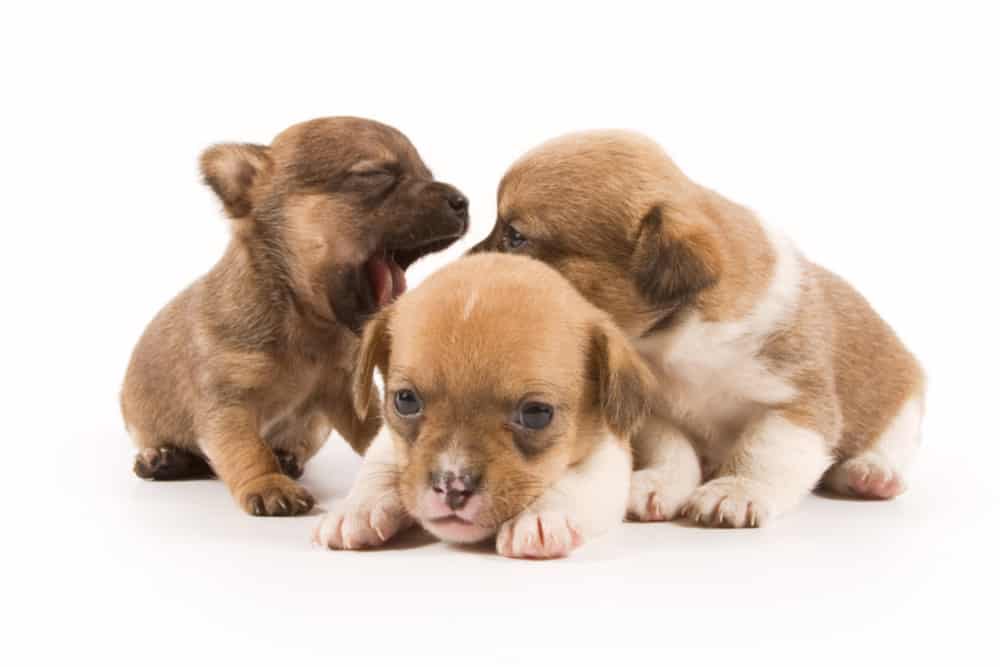Have you recently got yourself a four-legged friend? And, are you wondering how long their excitable outbursts of energy are going to last for? Well, read on to find out more about what age your puppy should start calming down.
However, we have a slight disclaimer because even though we are giving you an accurate guideline, this is by no means definite. Every dog is different, there is no instruction manual for each individual dog.

But, what we can give you is an estimated guideline for each dog breed.
Maturing To Full Size
So, as a baseline rule, dogs mature to their full size when they are 1-1.5 years old, and some larger breeds can take up to 2 years. In fact, a dog maturing works alongside the point in your dog’s life when it begins to calm down.
However, sorry to disappoint you but most dogs do not calm down when they become adults. Some breeds are just naturally very energetic, some of these breeds include but are not limited to: Siberian huskies, terriers and pit bulls.
These dogs should not be stuck inside all day, they need exercise to burn off some of this energy – and you would not want them to use up all this energy on your home furnishings… After all, there would be nothing worse than coming home to more than a chewed up shoe.
Spay And Neuter: Is It Worth It?
Spaying or neutering your dog can accelerate the calming down process of your dog, especially in male dogs.
Male dogs consistently produce testosterone so this will make him more energetic and active; neutering will reduce this drastically.
There is that and also the dilemma of nature trying to take over… so, twice a year a male or female might be extra cheeky and in some occasions, disobedient.
If you leave your dog outside you might find them trying to jump out of your yard and find the nearest female to mate with… yeah, there are times where love is in the air and it cannot be silenced.
Giving Your Pup A Duty
The ancient history of canines shows that they spent most of their time hunting out in the wilderness, and when us humans domesticated dogs they then became accustomed to helping us. It is a dogs’ instinct to stay pretty active, and they like to be busy constantly.
How can you keep your dog busy? By giving them toys and encouraging them to play. You can get so many dog toys on the market, and depending on what dog you have you can get a toy specifically to suit them.
Another great way to keep your dog busy is by encouraging them to play and interact with other dogs. A great way to do this is to take them to doggie daycare while you are at work.
Getting Your Puppy To Calm Down
In case it isn’t obvious to you already, puppies are huge balls of energy and they love to be on the go all the time.
Your puppy might follow your every move around the house, or they might be hiding from you and getting up to their own kind of mischief. Most of all your puppy’s high energy levels are super endearing and are what makes your puppy so adorable. Your puppy will always be up for playtime and being a little bit silly with you.
However, sometimes you will want your puppy to calm down a little bit – after all, we can’t all be high on life all the time! That and sometimes too much energy will encourage your pup to be super cheeky and try to get away with more naughty behavior.
If you do not encourage your pup to take some time to calm down, you may end up noticing that more of your home furnishings will be chewed up.
Now, your puppy’s intention is not to make you angry or stressed – they just want some attention, and they are also just burning off all this extra energy that they have.
Do not worry – this is totally normal for a puppy, and this is just a phase of your puppy enjoying their youth. Everything is new and exciting for your puppy – they want to have fun and explore their surroundings.
Like we said before, there is no set guideline for when your puppy will calm down. Every dog is different, let alone every breed. There are a few factors that will have an effect on your puppy’s energy levels.
So, if you are trying to work out when your puppy will calm down you should consider a few factors…
The Breed Of Your Puppy
The breed of your puppy is a contributing factor to their energy levels and their maturity.
The next time you visit a park where there are lots of dogs running around, you should notice that some breeds of dogs have much more energy than others.
Some dogs will be sprinting around the park, whereas others will be a lot more relaxed when it comes to exhausting their spurts of energy.

These dogs might be breeds that are commonly associated with sporting events, such as racing, and these dogs will hold onto their energy for that much longer. These dogs will be able to pace themselves a lot better and their bursts of energy will last that bit longer due to this.
These breeds will be energetic even in adulthood, but they will have tighter control over how they use their energy as they mature.
Additionally, the size of your dog will play a role in how much energy they have too. Smaller dogs should mature faster than larger dogs, so they should chill out and get past the adolescent stage a lot quicker.
Your Puppy’s Psychological State
So, as your puppy grows up and begins to familiarise itself with its new and exciting surroundings, also known as your home, you should continue to expose them to new and exciting locations and scenarios.
This will reduce the risk of your puppy growing up to be a super anxious and nervous dog. Alternatively, this will also reduce the risk of your puppy becoming aggressive and dominant as they age.
Keeping your puppy sheltered during their crucial months of development might result in them taking longer to mellow out as an adult, because they will be experiencing all the new sensations they should have got to grips with as a puppy at a later age.
Letting Your Puppy Make Friends
If you have more than one four-legged friend, then this will be a great way for your puppy to build confidence and interaction skills – and this will actually encourage them to mature quicker.
As humans, we may not completely understand the social structures amongst canines and we can see older dogs showing younger dogs how to behave properly – they sort of put them in their place with this sort of thing!
Older dogs will understand when to be playful and when to relax, puppies are still learning their boundaries.
The Gender Of Your Puppy
So, female dogs are said to mature a lot quicker than their male counterparts – in fact, most females are ready to procreate by the time they reach at least six months of age.
So, with this level of biological maturity will come a much more relaxed temperament.
Males will take a little longer – and of course, as a dog owner, you decide on whether to get your dog spayed or neutered, both of which will also have an effect on your dog’s maturity and therefore their temperament.
How Do Puppy Energy Levels Change?
As we have said before, no two dogs are the same. What does this mean in terms of your puppy’s energy levels?
Well, this is something that you will work out as you go along. One thing that is key to note is that all dogs have a similar growth pattern, so each breed has a similar window for your puppy to reach its full size.
As your puppy moves through its growth and development stages, you may notice some alterations in their levels of energy. Here is an approximate timeline of what you can expect for your puppy’s energy levels:
Your Newborn Puppy To Your Puppy At 10 Weeks Old
This is the stage where your puppy will experience the most growth and development changes. When your puppy is first born, they are extremely vulnerable and will depend on their mother for absolutely everything.
In fact, your puppy will not be able to open its eyes until it reaches two weeks of age. As your puppy grows, the mother will work out when she can allow it to roam around more freely and start to explore their surroundings.

It is important to note that your puppy will not leave their mother’s side for a while, until they become more curious about their surroundings.
Your 10 Week Old Puppy To Your Puppy At 16 Weeks Old
So, at this stage you should really be training your puppy. In fact, it should be part of their daily routine and something that they are used to.
Your four-legged friend should still be pretty energetic, but it will have pretty short attention spans – what does this mean for you? Patience is key.
We recommend that you keep your training sessions with your puppy concise so to keep their full focus, make sure that you are confident and resilient with your training sessions so you and your puppy make the most of these sessions.
In fact, this stage of your puppy’s growth could be likened to teenage years. Like every teenager, your puppy will work hard to test boundaries and venture into areas they are not supposed to. Is your puppy not allowed upstairs?
Well, in this phase of their life they might test their luck and see if they can sneak up with or without you spotting them.
Your 4 Month Old Puppy To Your 6 Month Old Puppy
After the 4 month mark, your puppy should be fully vaccinated. Use this as a chance to expose your puppy to even more environments and new aspects of the world that they have yet to experience.
Explore the outdoors and walk them to the destinations that you have not yet been able to because you have been waiting for them to get all their vaccines. Don’t get us wrong, your pup’s energy levels will still be pretty up there.
But, your puppy will now be focusing this energy on getting to know other dogs – this is where they work out how to bond with other dogs… and where they work out which dogs are their friends and which dogs they are not so keen on.
What you must be mindful of is if your puppy shows any signs of being overly anxious or overly angry – you need to squash these issues as soon as possible as they can be detrimental to your dog’s future development. If you are struggling to combat this, speak to a professional dog trainer.
Your 6 Month Old Puppy To Your 1 Year Old Puppy
At this stage, your puppy will be a lot more attuned to their daily routine and understand their surroundings and boundaries. But, do not be fooled! Training is not over yet.
Your puppy will still have lots of energy so regular exercise and socialising with other dogs must be part of their day-to-day routine. But, at this point your dog might start to calm down slightly.
This will not be a speedy change or a quick personality switch, but your dog being at ease in their surroundings – also known as your home – they will relax a lot more.
Your 1 Year Old Puppy To Your 2 Year Old Puppy
Well, at this point it is pretty debatable as to whether you should still be referring to your dog as a puppy, we’d say it’s still pretty acceptable. After all, they will always be your baby!
Depending on what breed your puppy is, this is where they will find themselves reaching full adulthood. Larger breeds do take a little longer to mature so this may be closer to the 2 years old stage of their life.
Although your dog will be a lot calmer, this does not mean that they suddenly lose all their energy. Oh no, your dog will still be pretty active. But, they will reserve their energy for playing or for going out for walks. They will understand how to conserve their energy.
How Can You Calm Down Your Excitable Puppy?
So, now we have explored an approximate timeline for your puppy’s growth and development, here we can focus on the best methods of training your dog.
Some of the best ways to train your puppy are as follows:
Regular Exercise With Your Puppy
So, this is a great way for your puppy to burn off a lot of that energy that they have.
After all, a bored puppy is a puppy that is more likely to cause chaos and destruction. Long walks and rounds of fetch will help your puppy to burn off a lot of energy, and when you return home they will sleep pretty blissfully.
Testing Your Puppy’s Mental Agility
So, when it comes to your puppy’s growth and development, mental strength is just as important as physical strength. If you have to leave your puppy on its own while you head out of the house, be it for work commitments or a supermarket visit, make sure you leave your puppy with lots of toys.
These provide great distractions so your puppy won’t get bored and chew your furniture to pieces, or they won’t get anxious and have any sort of toileting accidents in the house.
Giving Your Puppy A Solid And Consistent Daily Routine
Like us humans, your puppy will enjoy having a daily routine and they will get used to it. Your puppy will get familiar with the times you usually take them out for a walk, and they will sit and wait for you impatiently to leave the house.
When it comes to routine, make sure you feed your puppy at set times and not too close to bedtime. Before you head out for a walk or before you have a play session are the perfect times to feed your puppy as this will give them lots of energy to spend on their walk and play session.
Before bed is not an ideal feeding time because this will just waste their energy. They will stay awake longer, so chances are both you and your puppy will have a sleepless night if you feed them too close to bedtime.
Give Your Puppy Crate Training
So this is a love/hate form of training amongst dog owners, but crate training is proven to be one of the strongest dog training techniques you can use. Lots of owners see it as a form of punishment, but it does not have to be at all.
Your puppy’s crate will become their haven – it is where they can sleep and relax, after all. When your puppy gets comfortable with their crate space, they will start to associate it with relaxation and complete safety.
So, when your puppy gets too hyper – put them in their crate for a bit of relaxation where they can naturally calm down, or have a little snooze.
Training Your Puppy To Be Obedient
This is a crucial part of training your puppy that you should not forget about.
Your puppy must know when they have to listen to your commands, and training them properly will keep your puppy secure and allow you as the owner to calm any stressful situations.
Training your puppy to sit is an example of obedience training because your puppy will be giving you their undivided attention. The strongest commands that encourage obedience are ones that involve getting your dog to sit and listen to you.
If You Ignore Your Puppy’s Outburst, Eventually They Will Calm Down
like a naughty child, if you give your puppy too much attention this might encourage them to carry on with their burst of energy. However, if you ignore your puppy it might eventually get bored and will want your full attention again.
Gradually, your puppy will learn that they cannot always get your attention by being mischievous or by being super energetic. This is definitely a practice-makes-perfect kind of method, but if you are really unsure on how to calm down your puppy, then sometimes ignoring them might be your best option.
Additionally, your puppy needs to be taught not to get excited at every and any occasion. For instance, you coming home from work should not encourage lots of barking as you do this every day.
The worst thing you can do is encourage your puppy to behave in this way. How do you do this without realising? By giving them a treat to keep them quiet. To your dog, this then becomes rewarded behavior, so they know that if they bark at you then you will reward them with a treat.
So, to answer the question: at what age do puppies calm down? Well, most puppies should start to chill out when they reach 6 to 9 months of age.
By the time that they fully mature, all of their excess puppy energy should begin to decrease – and your dog will work out when they should save and expend their energy.
Like we said earlier, every dog is different – so what we have outlined here are just guidelines.
But, they should help you in working out your puppy’s behavioral habits and this in turn should help you to train your puppy in a way that suits them and you. After all, training your puppy should be as fun for you as it is for them.
Just remember that patience is key – and good things come to those who wait! Or, in this case good things come to those who train their puppies.




